Organisational Behaviour Report: Culture, Motivation and Leadership
VerifiedAdded on 2023/06/08
|13
|4580
|161
Report
AI Summary
This report delves into the multifaceted realm of organisational behaviour, examining the intricate interplay of culture, power, and politics and their profound impact on individual and team dynamics within an organisation. The report uses Royal Dutch Shell as a case study. It explores how these factors influence employee behaviour and performance. It dissects various motivational theories, including the ERG theory and equity theory, to understand how they can be applied to influence behaviour. Furthermore, it critically analyses the impact of leadership styles and team development theories, offering recommendations for enhancing business performance and productivity. The report emphasizes the significance of fostering a positive work environment and promoting employee engagement to achieve organisational goals. The report concludes by providing a holistic understanding of organisational behaviour and its practical implications in a business context.
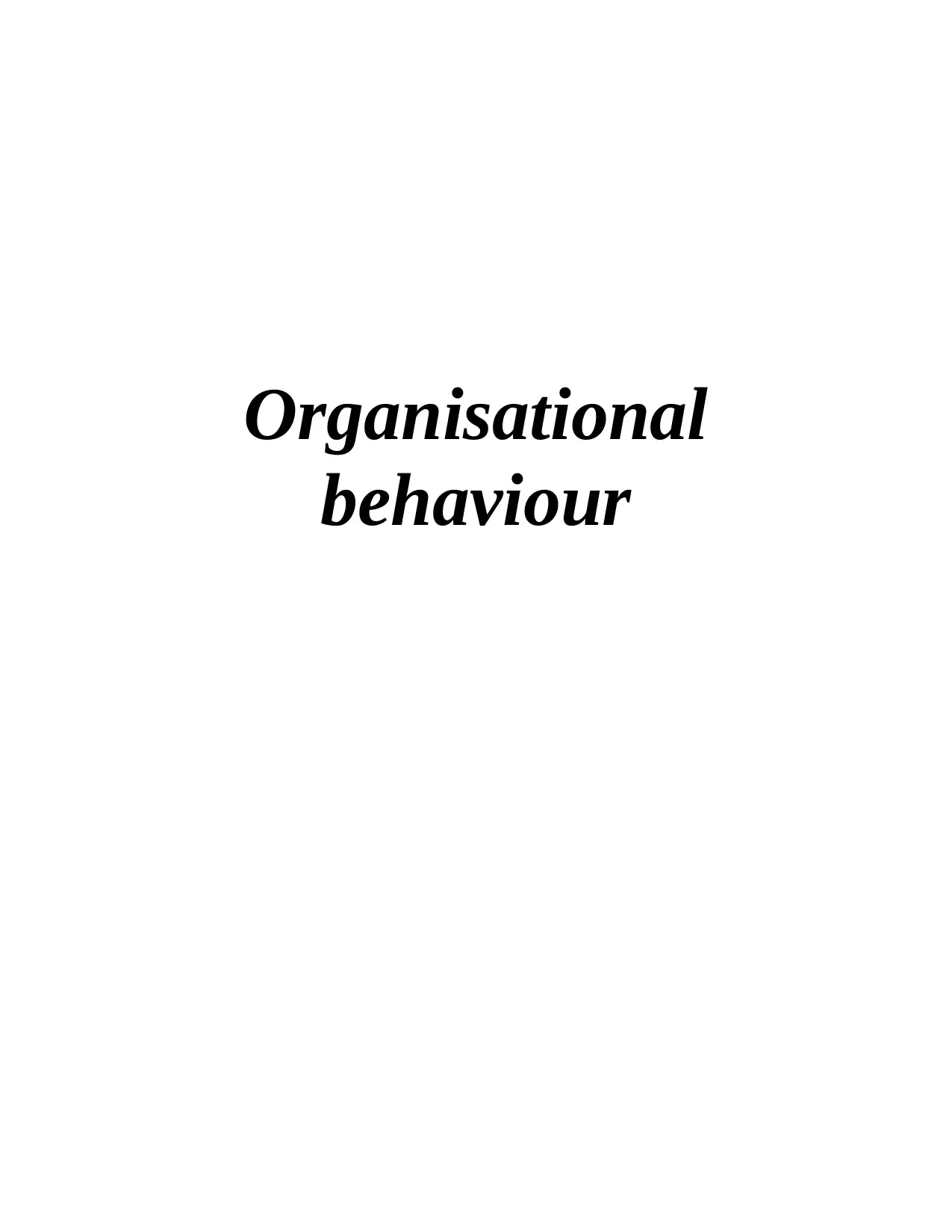
Organisational
behaviour
behaviour
Paraphrase This Document
Need a fresh take? Get an instant paraphrase of this document with our AI Paraphraser
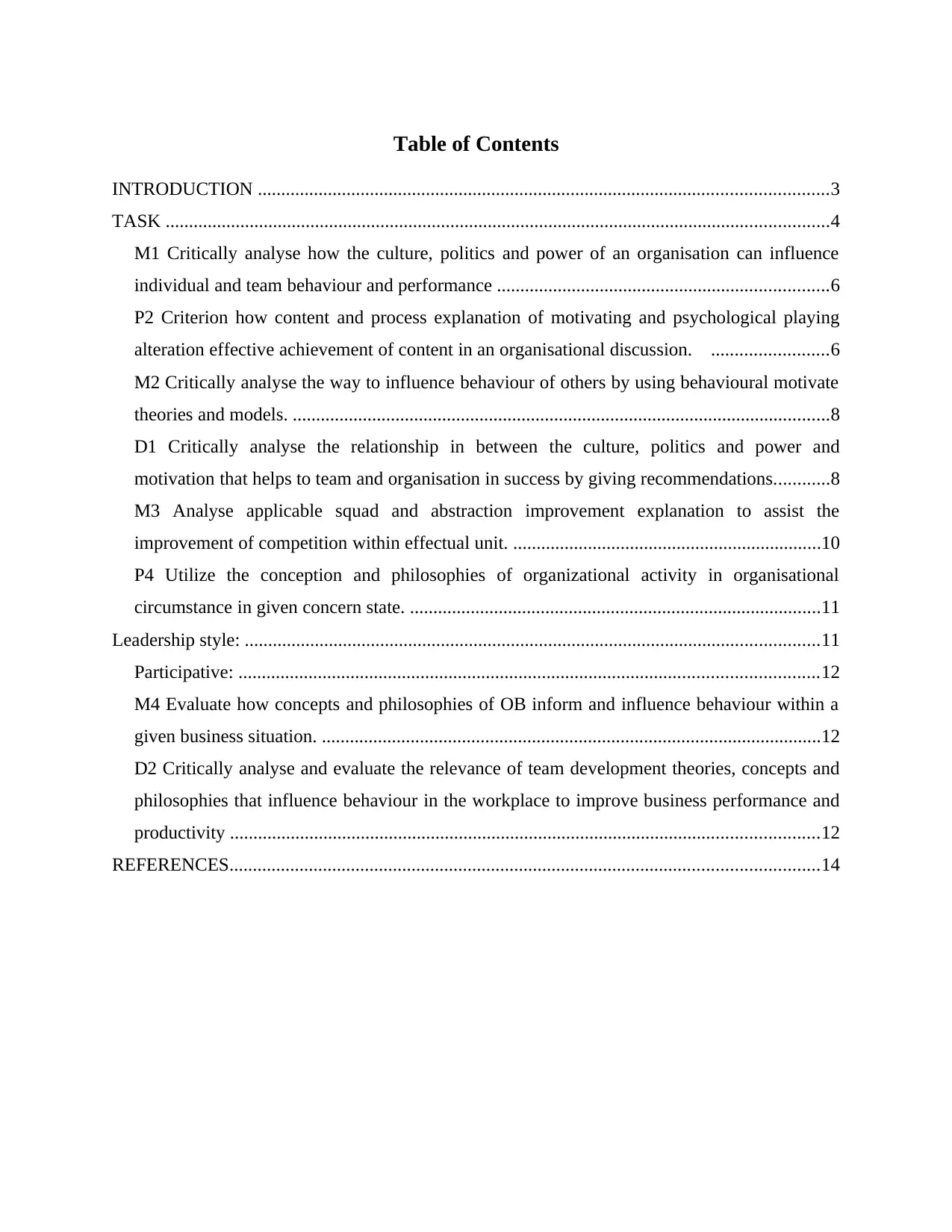
Table of Contents
INTRODUCTION ..........................................................................................................................3
TASK ..............................................................................................................................................4
M1 Critically analyse how the culture, politics and power of an organisation can influence
individual and team behaviour and performance .......................................................................6
P2 Criterion how content and process explanation of motivating and psychological playing
alteration effective achievement of content in an organisational discussion. .........................6
M2 Critically analyse the way to influence behaviour of others by using behavioural motivate
theories and models. ...................................................................................................................8
D1 Critically analyse the relationship in between the culture, politics and power and
motivation that helps to team and organisation in success by giving recommendations............8
M3 Analyse applicable squad and abstraction improvement explanation to assist the
improvement of competition within effectual unit. ..................................................................10
P4 Utilize the conception and philosophies of organizational activity in organisational
circumstance in given concern state. ........................................................................................11
Leadership style: ...........................................................................................................................11
Participative: ............................................................................................................................12
M4 Evaluate how concepts and philosophies of OB inform and influence behaviour within a
given business situation. ...........................................................................................................12
D2 Critically analyse and evaluate the relevance of team development theories, concepts and
philosophies that influence behaviour in the workplace to improve business performance and
productivity ..............................................................................................................................12
REFERENCES..............................................................................................................................14
INTRODUCTION ..........................................................................................................................3
TASK ..............................................................................................................................................4
M1 Critically analyse how the culture, politics and power of an organisation can influence
individual and team behaviour and performance .......................................................................6
P2 Criterion how content and process explanation of motivating and psychological playing
alteration effective achievement of content in an organisational discussion. .........................6
M2 Critically analyse the way to influence behaviour of others by using behavioural motivate
theories and models. ...................................................................................................................8
D1 Critically analyse the relationship in between the culture, politics and power and
motivation that helps to team and organisation in success by giving recommendations............8
M3 Analyse applicable squad and abstraction improvement explanation to assist the
improvement of competition within effectual unit. ..................................................................10
P4 Utilize the conception and philosophies of organizational activity in organisational
circumstance in given concern state. ........................................................................................11
Leadership style: ...........................................................................................................................11
Participative: ............................................................................................................................12
M4 Evaluate how concepts and philosophies of OB inform and influence behaviour within a
given business situation. ...........................................................................................................12
D2 Critically analyse and evaluate the relevance of team development theories, concepts and
philosophies that influence behaviour in the workplace to improve business performance and
productivity ..............................................................................................................................12
REFERENCES..............................................................................................................................14
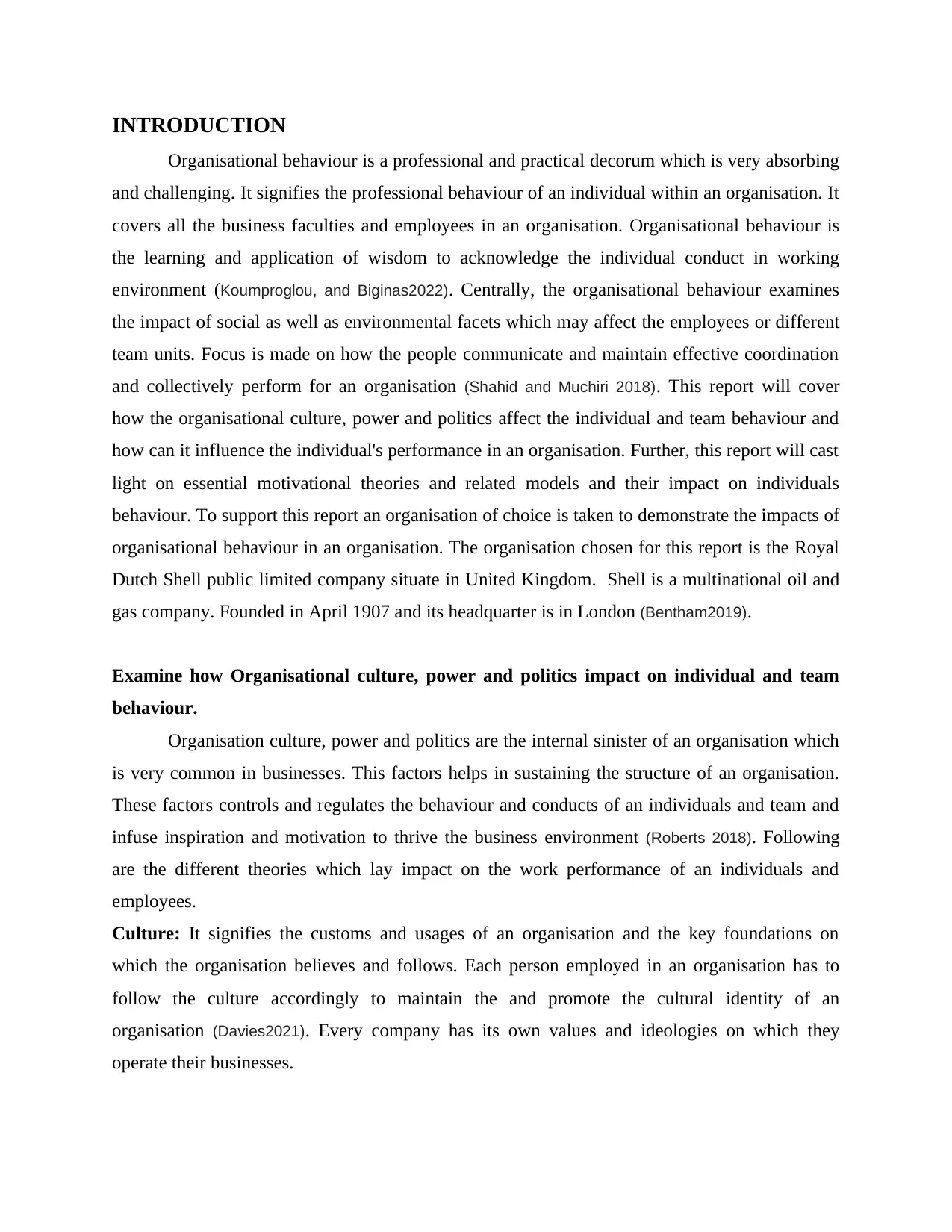
INTRODUCTION
Organisational behaviour is a professional and practical decorum which is very absorbing
and challenging. It signifies the professional behaviour of an individual within an organisation. It
covers all the business faculties and employees in an organisation. Organisational behaviour is
the learning and application of wisdom to acknowledge the individual conduct in working
environment (Koumproglou, and Biginas2022). Centrally, the organisational behaviour examines
the impact of social as well as environmental facets which may affect the employees or different
team units. Focus is made on how the people communicate and maintain effective coordination
and collectively perform for an organisation (Shahid and Muchiri 2018). This report will cover
how the organisational culture, power and politics affect the individual and team behaviour and
how can it influence the individual's performance in an organisation. Further, this report will cast
light on essential motivational theories and related models and their impact on individuals
behaviour. To support this report an organisation of choice is taken to demonstrate the impacts of
organisational behaviour in an organisation. The organisation chosen for this report is the Royal
Dutch Shell public limited company situate in United Kingdom. Shell is a multinational oil and
gas company. Founded in April 1907 and its headquarter is in London (Bentham2019).
Examine how Organisational culture, power and politics impact on individual and team
behaviour.
Organisation culture, power and politics are the internal sinister of an organisation which
is very common in businesses. This factors helps in sustaining the structure of an organisation.
These factors controls and regulates the behaviour and conducts of an individuals and team and
infuse inspiration and motivation to thrive the business environment (Roberts 2018). Following
are the different theories which lay impact on the work performance of an individuals and
employees.
Culture: It signifies the customs and usages of an organisation and the key foundations on
which the organisation believes and follows. Each person employed in an organisation has to
follow the culture accordingly to maintain the and promote the cultural identity of an
organisation (Davies2021). Every company has its own values and ideologies on which they
operate their businesses.
Organisational behaviour is a professional and practical decorum which is very absorbing
and challenging. It signifies the professional behaviour of an individual within an organisation. It
covers all the business faculties and employees in an organisation. Organisational behaviour is
the learning and application of wisdom to acknowledge the individual conduct in working
environment (Koumproglou, and Biginas2022). Centrally, the organisational behaviour examines
the impact of social as well as environmental facets which may affect the employees or different
team units. Focus is made on how the people communicate and maintain effective coordination
and collectively perform for an organisation (Shahid and Muchiri 2018). This report will cover
how the organisational culture, power and politics affect the individual and team behaviour and
how can it influence the individual's performance in an organisation. Further, this report will cast
light on essential motivational theories and related models and their impact on individuals
behaviour. To support this report an organisation of choice is taken to demonstrate the impacts of
organisational behaviour in an organisation. The organisation chosen for this report is the Royal
Dutch Shell public limited company situate in United Kingdom. Shell is a multinational oil and
gas company. Founded in April 1907 and its headquarter is in London (Bentham2019).
Examine how Organisational culture, power and politics impact on individual and team
behaviour.
Organisation culture, power and politics are the internal sinister of an organisation which
is very common in businesses. This factors helps in sustaining the structure of an organisation.
These factors controls and regulates the behaviour and conducts of an individuals and team and
infuse inspiration and motivation to thrive the business environment (Roberts 2018). Following
are the different theories which lay impact on the work performance of an individuals and
employees.
Culture: It signifies the customs and usages of an organisation and the key foundations on
which the organisation believes and follows. Each person employed in an organisation has to
follow the culture accordingly to maintain the and promote the cultural identity of an
organisation (Davies2021). Every company has its own values and ideologies on which they
operate their businesses.
⊘ This is a preview!⊘
Do you want full access?
Subscribe today to unlock all pages.

Trusted by 1+ million students worldwide
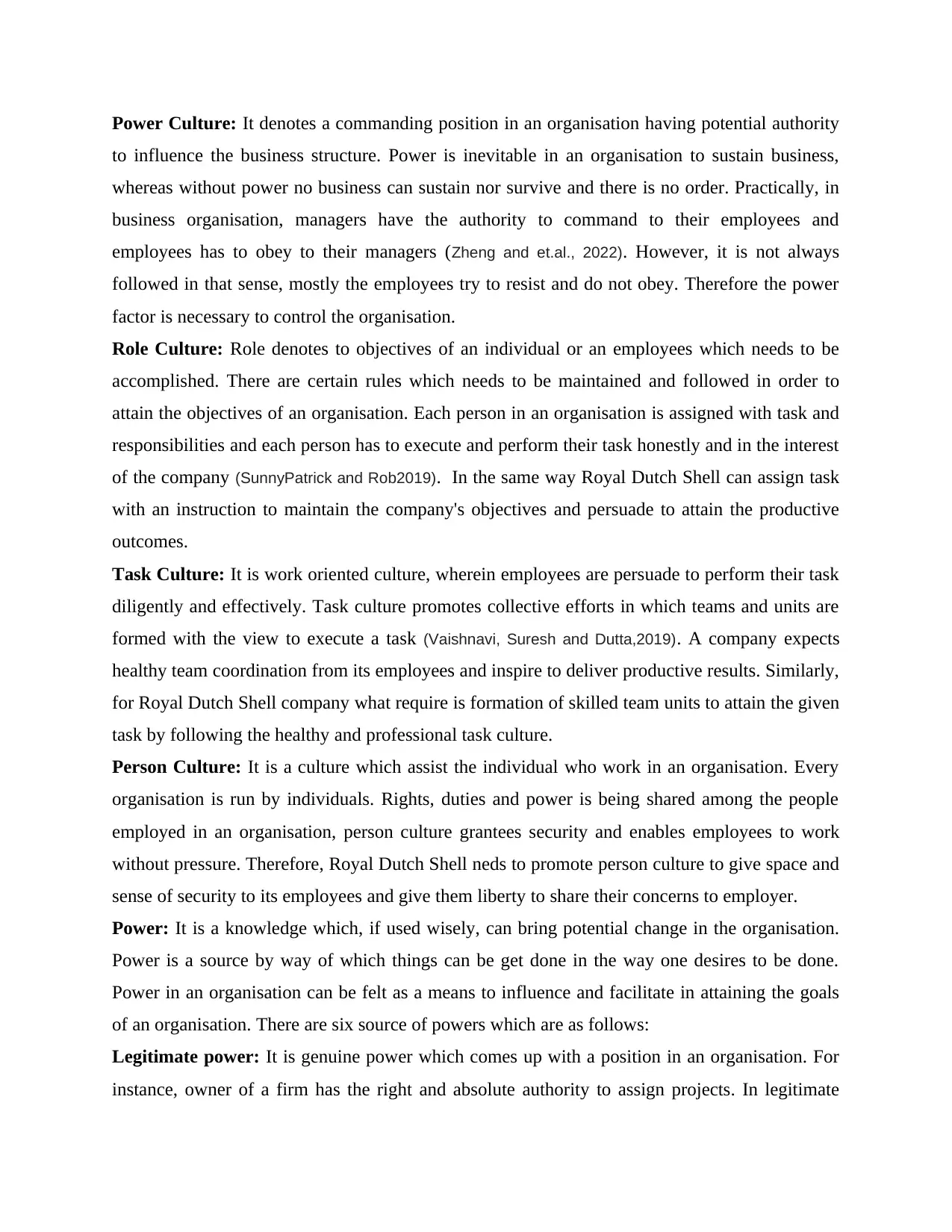
Power Culture: It denotes a commanding position in an organisation having potential authority
to influence the business structure. Power is inevitable in an organisation to sustain business,
whereas without power no business can sustain nor survive and there is no order. Practically, in
business organisation, managers have the authority to command to their employees and
employees has to obey to their managers (Zheng and et.al., 2022). However, it is not always
followed in that sense, mostly the employees try to resist and do not obey. Therefore the power
factor is necessary to control the organisation.
Role Culture: Role denotes to objectives of an individual or an employees which needs to be
accomplished. There are certain rules which needs to be maintained and followed in order to
attain the objectives of an organisation. Each person in an organisation is assigned with task and
responsibilities and each person has to execute and perform their task honestly and in the interest
of the company (SunnyPatrick and Rob2019). In the same way Royal Dutch Shell can assign task
with an instruction to maintain the company's objectives and persuade to attain the productive
outcomes.
Task Culture: It is work oriented culture, wherein employees are persuade to perform their task
diligently and effectively. Task culture promotes collective efforts in which teams and units are
formed with the view to execute a task (Vaishnavi, Suresh and Dutta,2019). A company expects
healthy team coordination from its employees and inspire to deliver productive results. Similarly,
for Royal Dutch Shell company what require is formation of skilled team units to attain the given
task by following the healthy and professional task culture.
Person Culture: It is a culture which assist the individual who work in an organisation. Every
organisation is run by individuals. Rights, duties and power is being shared among the people
employed in an organisation, person culture grantees security and enables employees to work
without pressure. Therefore, Royal Dutch Shell neds to promote person culture to give space and
sense of security to its employees and give them liberty to share their concerns to employer.
Power: It is a knowledge which, if used wisely, can bring potential change in the organisation.
Power is a source by way of which things can be get done in the way one desires to be done.
Power in an organisation can be felt as a means to influence and facilitate in attaining the goals
of an organisation. There are six source of powers which are as follows:
Legitimate power: It is genuine power which comes up with a position in an organisation. For
instance, owner of a firm has the right and absolute authority to assign projects. In legitimate
to influence the business structure. Power is inevitable in an organisation to sustain business,
whereas without power no business can sustain nor survive and there is no order. Practically, in
business organisation, managers have the authority to command to their employees and
employees has to obey to their managers (Zheng and et.al., 2022). However, it is not always
followed in that sense, mostly the employees try to resist and do not obey. Therefore the power
factor is necessary to control the organisation.
Role Culture: Role denotes to objectives of an individual or an employees which needs to be
accomplished. There are certain rules which needs to be maintained and followed in order to
attain the objectives of an organisation. Each person in an organisation is assigned with task and
responsibilities and each person has to execute and perform their task honestly and in the interest
of the company (SunnyPatrick and Rob2019). In the same way Royal Dutch Shell can assign task
with an instruction to maintain the company's objectives and persuade to attain the productive
outcomes.
Task Culture: It is work oriented culture, wherein employees are persuade to perform their task
diligently and effectively. Task culture promotes collective efforts in which teams and units are
formed with the view to execute a task (Vaishnavi, Suresh and Dutta,2019). A company expects
healthy team coordination from its employees and inspire to deliver productive results. Similarly,
for Royal Dutch Shell company what require is formation of skilled team units to attain the given
task by following the healthy and professional task culture.
Person Culture: It is a culture which assist the individual who work in an organisation. Every
organisation is run by individuals. Rights, duties and power is being shared among the people
employed in an organisation, person culture grantees security and enables employees to work
without pressure. Therefore, Royal Dutch Shell neds to promote person culture to give space and
sense of security to its employees and give them liberty to share their concerns to employer.
Power: It is a knowledge which, if used wisely, can bring potential change in the organisation.
Power is a source by way of which things can be get done in the way one desires to be done.
Power in an organisation can be felt as a means to influence and facilitate in attaining the goals
of an organisation. There are six source of powers which are as follows:
Legitimate power: It is genuine power which comes up with a position in an organisation. For
instance, owner of a firm has the right and absolute authority to assign projects. In legitimate
Paraphrase This Document
Need a fresh take? Get an instant paraphrase of this document with our AI Paraphraser
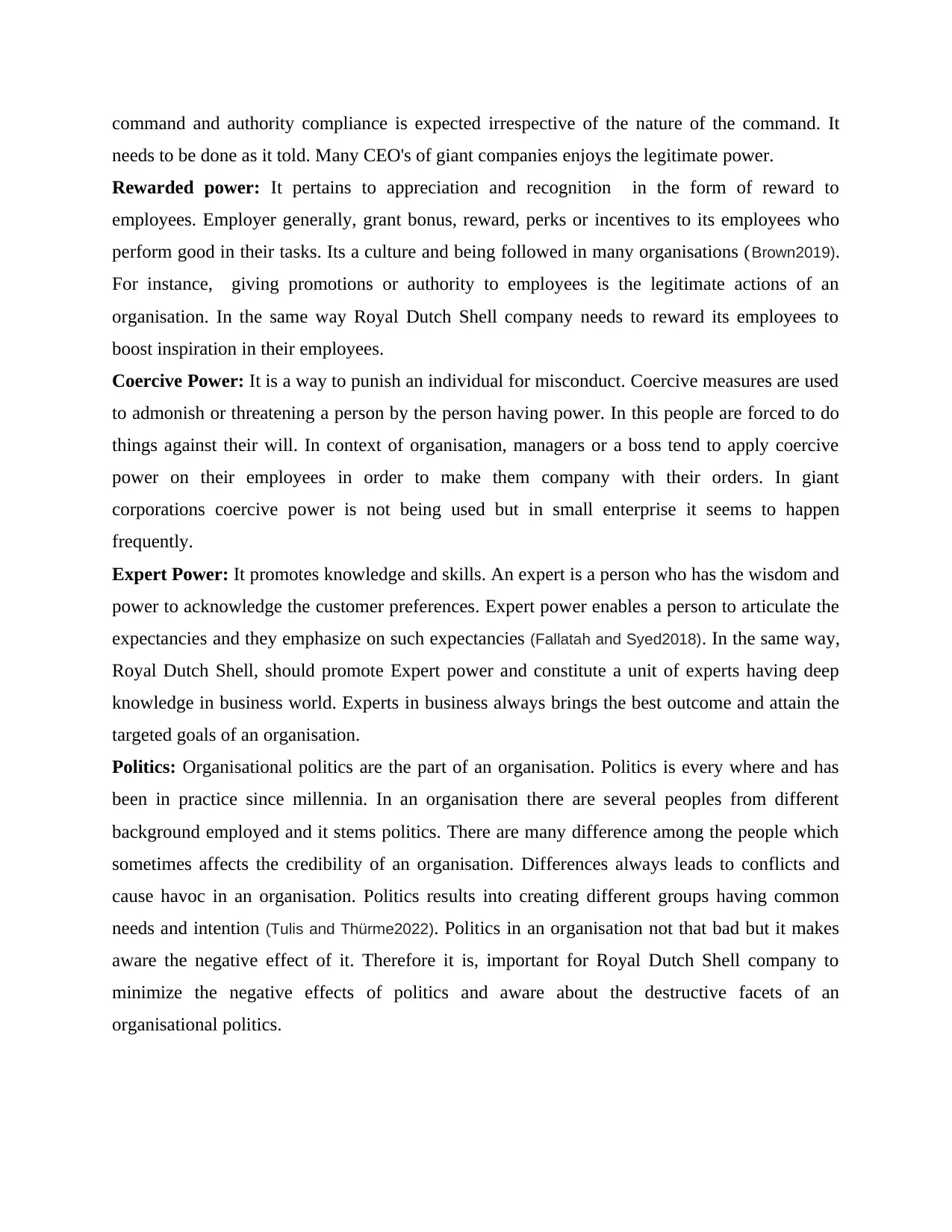
command and authority compliance is expected irrespective of the nature of the command. It
needs to be done as it told. Many CEO's of giant companies enjoys the legitimate power.
Rewarded power: It pertains to appreciation and recognition in the form of reward to
employees. Employer generally, grant bonus, reward, perks or incentives to its employees who
perform good in their tasks. Its a culture and being followed in many organisations (Brown2019).
For instance, giving promotions or authority to employees is the legitimate actions of an
organisation. In the same way Royal Dutch Shell company needs to reward its employees to
boost inspiration in their employees.
Coercive Power: It is a way to punish an individual for misconduct. Coercive measures are used
to admonish or threatening a person by the person having power. In this people are forced to do
things against their will. In context of organisation, managers or a boss tend to apply coercive
power on their employees in order to make them company with their orders. In giant
corporations coercive power is not being used but in small enterprise it seems to happen
frequently.
Expert Power: It promotes knowledge and skills. An expert is a person who has the wisdom and
power to acknowledge the customer preferences. Expert power enables a person to articulate the
expectancies and they emphasize on such expectancies (Fallatah and Syed2018). In the same way,
Royal Dutch Shell, should promote Expert power and constitute a unit of experts having deep
knowledge in business world. Experts in business always brings the best outcome and attain the
targeted goals of an organisation.
Politics: Organisational politics are the part of an organisation. Politics is every where and has
been in practice since millennia. In an organisation there are several peoples from different
background employed and it stems politics. There are many difference among the people which
sometimes affects the credibility of an organisation. Differences always leads to conflicts and
cause havoc in an organisation. Politics results into creating different groups having common
needs and intention (Tulis and Thürme2022). Politics in an organisation not that bad but it makes
aware the negative effect of it. Therefore it is, important for Royal Dutch Shell company to
minimize the negative effects of politics and aware about the destructive facets of an
organisational politics.
needs to be done as it told. Many CEO's of giant companies enjoys the legitimate power.
Rewarded power: It pertains to appreciation and recognition in the form of reward to
employees. Employer generally, grant bonus, reward, perks or incentives to its employees who
perform good in their tasks. Its a culture and being followed in many organisations (Brown2019).
For instance, giving promotions or authority to employees is the legitimate actions of an
organisation. In the same way Royal Dutch Shell company needs to reward its employees to
boost inspiration in their employees.
Coercive Power: It is a way to punish an individual for misconduct. Coercive measures are used
to admonish or threatening a person by the person having power. In this people are forced to do
things against their will. In context of organisation, managers or a boss tend to apply coercive
power on their employees in order to make them company with their orders. In giant
corporations coercive power is not being used but in small enterprise it seems to happen
frequently.
Expert Power: It promotes knowledge and skills. An expert is a person who has the wisdom and
power to acknowledge the customer preferences. Expert power enables a person to articulate the
expectancies and they emphasize on such expectancies (Fallatah and Syed2018). In the same way,
Royal Dutch Shell, should promote Expert power and constitute a unit of experts having deep
knowledge in business world. Experts in business always brings the best outcome and attain the
targeted goals of an organisation.
Politics: Organisational politics are the part of an organisation. Politics is every where and has
been in practice since millennia. In an organisation there are several peoples from different
background employed and it stems politics. There are many difference among the people which
sometimes affects the credibility of an organisation. Differences always leads to conflicts and
cause havoc in an organisation. Politics results into creating different groups having common
needs and intention (Tulis and Thürme2022). Politics in an organisation not that bad but it makes
aware the negative effect of it. Therefore it is, important for Royal Dutch Shell company to
minimize the negative effects of politics and aware about the destructive facets of an
organisational politics.
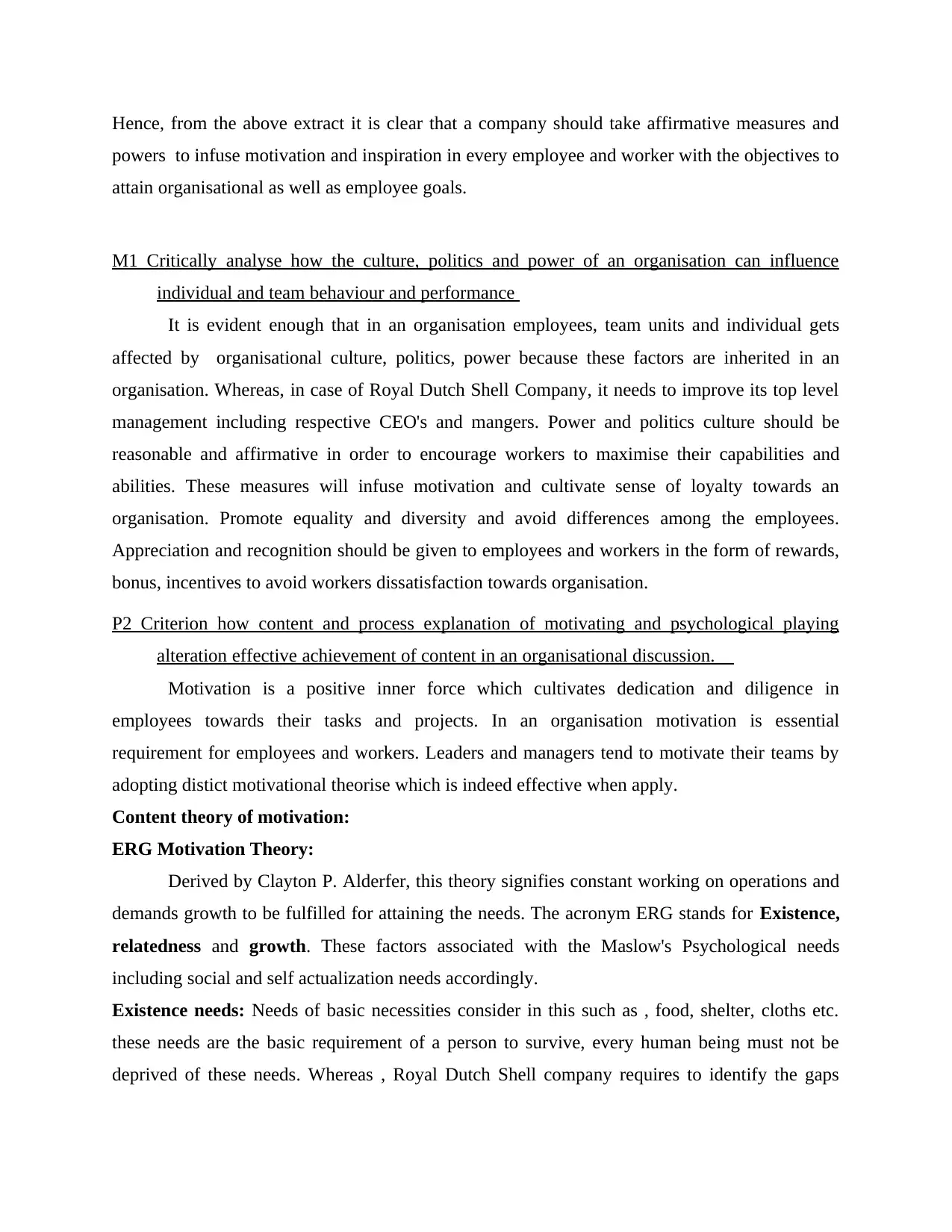
Hence, from the above extract it is clear that a company should take affirmative measures and
powers to infuse motivation and inspiration in every employee and worker with the objectives to
attain organisational as well as employee goals.
M1 Critically analyse how the culture, politics and power of an organisation can influence
individual and team behaviour and performance
It is evident enough that in an organisation employees, team units and individual gets
affected by organisational culture, politics, power because these factors are inherited in an
organisation. Whereas, in case of Royal Dutch Shell Company, it needs to improve its top level
management including respective CEO's and mangers. Power and politics culture should be
reasonable and affirmative in order to encourage workers to maximise their capabilities and
abilities. These measures will infuse motivation and cultivate sense of loyalty towards an
organisation. Promote equality and diversity and avoid differences among the employees.
Appreciation and recognition should be given to employees and workers in the form of rewards,
bonus, incentives to avoid workers dissatisfaction towards organisation.
P2 Criterion how content and process explanation of motivating and psychological playing
alteration effective achievement of content in an organisational discussion.
Motivation is a positive inner force which cultivates dedication and diligence in
employees towards their tasks and projects. In an organisation motivation is essential
requirement for employees and workers. Leaders and managers tend to motivate their teams by
adopting distict motivational theorise which is indeed effective when apply.
Content theory of motivation:
ERG Motivation Theory:
Derived by Clayton P. Alderfer, this theory signifies constant working on operations and
demands growth to be fulfilled for attaining the needs. The acronym ERG stands for Existence,
relatedness and growth. These factors associated with the Maslow's Psychological needs
including social and self actualization needs accordingly.
Existence needs: Needs of basic necessities consider in this such as , food, shelter, cloths etc.
these needs are the basic requirement of a person to survive, every human being must not be
deprived of these needs. Whereas , Royal Dutch Shell company requires to identify the gaps
powers to infuse motivation and inspiration in every employee and worker with the objectives to
attain organisational as well as employee goals.
M1 Critically analyse how the culture, politics and power of an organisation can influence
individual and team behaviour and performance
It is evident enough that in an organisation employees, team units and individual gets
affected by organisational culture, politics, power because these factors are inherited in an
organisation. Whereas, in case of Royal Dutch Shell Company, it needs to improve its top level
management including respective CEO's and mangers. Power and politics culture should be
reasonable and affirmative in order to encourage workers to maximise their capabilities and
abilities. These measures will infuse motivation and cultivate sense of loyalty towards an
organisation. Promote equality and diversity and avoid differences among the employees.
Appreciation and recognition should be given to employees and workers in the form of rewards,
bonus, incentives to avoid workers dissatisfaction towards organisation.
P2 Criterion how content and process explanation of motivating and psychological playing
alteration effective achievement of content in an organisational discussion.
Motivation is a positive inner force which cultivates dedication and diligence in
employees towards their tasks and projects. In an organisation motivation is essential
requirement for employees and workers. Leaders and managers tend to motivate their teams by
adopting distict motivational theorise which is indeed effective when apply.
Content theory of motivation:
ERG Motivation Theory:
Derived by Clayton P. Alderfer, this theory signifies constant working on operations and
demands growth to be fulfilled for attaining the needs. The acronym ERG stands for Existence,
relatedness and growth. These factors associated with the Maslow's Psychological needs
including social and self actualization needs accordingly.
Existence needs: Needs of basic necessities consider in this such as , food, shelter, cloths etc.
these needs are the basic requirement of a person to survive, every human being must not be
deprived of these needs. Whereas , Royal Dutch Shell company requires to identify the gaps
⊘ This is a preview!⊘
Do you want full access?
Subscribe today to unlock all pages.

Trusted by 1+ million students worldwide
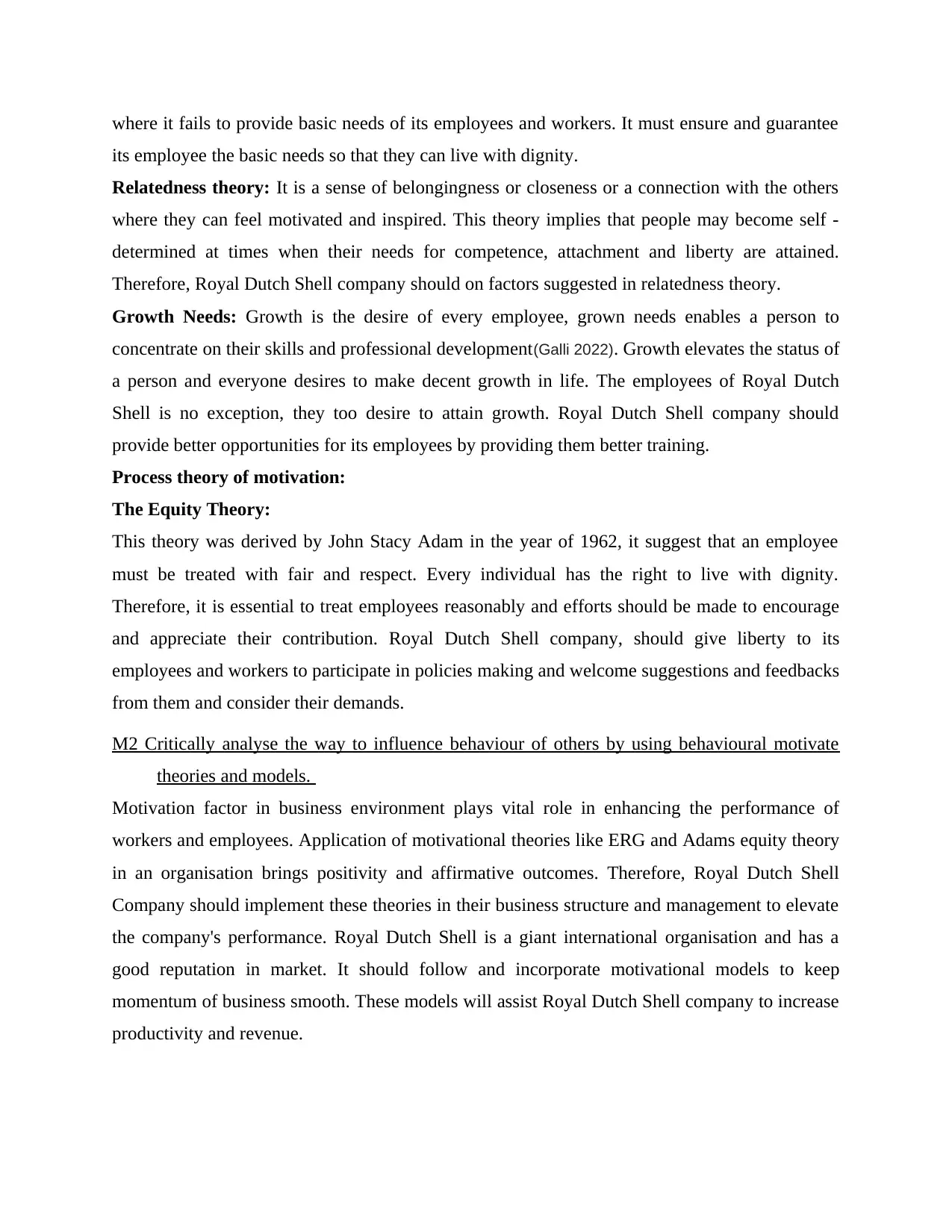
where it fails to provide basic needs of its employees and workers. It must ensure and guarantee
its employee the basic needs so that they can live with dignity.
Relatedness theory: It is a sense of belongingness or closeness or a connection with the others
where they can feel motivated and inspired. This theory implies that people may become self -
determined at times when their needs for competence, attachment and liberty are attained.
Therefore, Royal Dutch Shell company should on factors suggested in relatedness theory.
Growth Needs: Growth is the desire of every employee, grown needs enables a person to
concentrate on their skills and professional development(Galli 2022). Growth elevates the status of
a person and everyone desires to make decent growth in life. The employees of Royal Dutch
Shell is no exception, they too desire to attain growth. Royal Dutch Shell company should
provide better opportunities for its employees by providing them better training.
Process theory of motivation:
The Equity Theory:
This theory was derived by John Stacy Adam in the year of 1962, it suggest that an employee
must be treated with fair and respect. Every individual has the right to live with dignity.
Therefore, it is essential to treat employees reasonably and efforts should be made to encourage
and appreciate their contribution. Royal Dutch Shell company, should give liberty to its
employees and workers to participate in policies making and welcome suggestions and feedbacks
from them and consider their demands.
M2 Critically analyse the way to influence behaviour of others by using behavioural motivate
theories and models.
Motivation factor in business environment plays vital role in enhancing the performance of
workers and employees. Application of motivational theories like ERG and Adams equity theory
in an organisation brings positivity and affirmative outcomes. Therefore, Royal Dutch Shell
Company should implement these theories in their business structure and management to elevate
the company's performance. Royal Dutch Shell is a giant international organisation and has a
good reputation in market. It should follow and incorporate motivational models to keep
momentum of business smooth. These models will assist Royal Dutch Shell company to increase
productivity and revenue.
its employee the basic needs so that they can live with dignity.
Relatedness theory: It is a sense of belongingness or closeness or a connection with the others
where they can feel motivated and inspired. This theory implies that people may become self -
determined at times when their needs for competence, attachment and liberty are attained.
Therefore, Royal Dutch Shell company should on factors suggested in relatedness theory.
Growth Needs: Growth is the desire of every employee, grown needs enables a person to
concentrate on their skills and professional development(Galli 2022). Growth elevates the status of
a person and everyone desires to make decent growth in life. The employees of Royal Dutch
Shell is no exception, they too desire to attain growth. Royal Dutch Shell company should
provide better opportunities for its employees by providing them better training.
Process theory of motivation:
The Equity Theory:
This theory was derived by John Stacy Adam in the year of 1962, it suggest that an employee
must be treated with fair and respect. Every individual has the right to live with dignity.
Therefore, it is essential to treat employees reasonably and efforts should be made to encourage
and appreciate their contribution. Royal Dutch Shell company, should give liberty to its
employees and workers to participate in policies making and welcome suggestions and feedbacks
from them and consider their demands.
M2 Critically analyse the way to influence behaviour of others by using behavioural motivate
theories and models.
Motivation factor in business environment plays vital role in enhancing the performance of
workers and employees. Application of motivational theories like ERG and Adams equity theory
in an organisation brings positivity and affirmative outcomes. Therefore, Royal Dutch Shell
Company should implement these theories in their business structure and management to elevate
the company's performance. Royal Dutch Shell is a giant international organisation and has a
good reputation in market. It should follow and incorporate motivational models to keep
momentum of business smooth. These models will assist Royal Dutch Shell company to increase
productivity and revenue.
Paraphrase This Document
Need a fresh take? Get an instant paraphrase of this document with our AI Paraphraser
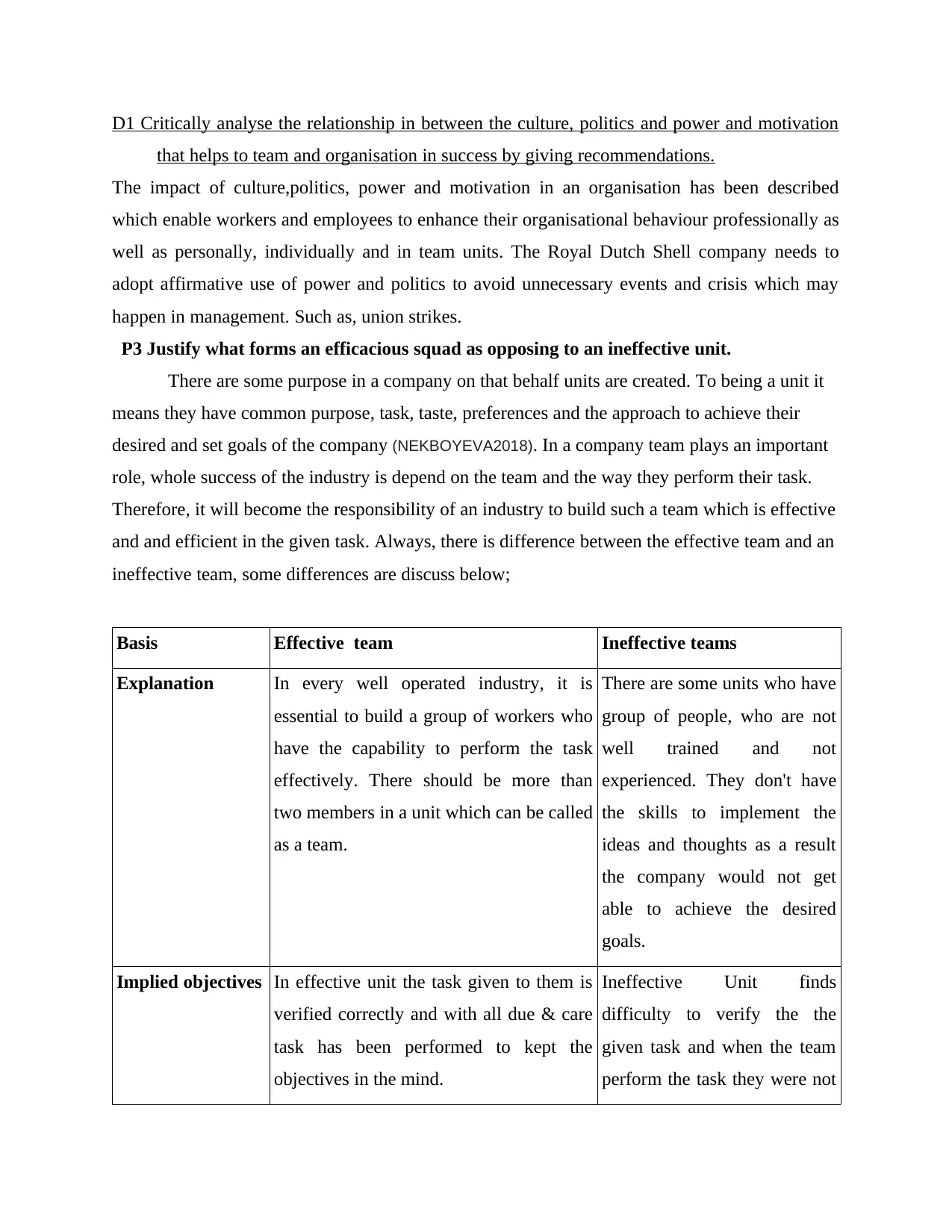
D1 Critically analyse the relationship in between the culture, politics and power and motivation
that helps to team and organisation in success by giving recommendations.
The impact of culture,politics, power and motivation in an organisation has been described
which enable workers and employees to enhance their organisational behaviour professionally as
well as personally, individually and in team units. The Royal Dutch Shell company needs to
adopt affirmative use of power and politics to avoid unnecessary events and crisis which may
happen in management. Such as, union strikes.
P3 Justify what forms an efficacious squad as opposing to an ineffective unit.
There are some purpose in a company on that behalf units are created. To being a unit it
means they have common purpose, task, taste, preferences and the approach to achieve their
desired and set goals of the company (NEKBOYEVA2018). In a company team plays an important
role, whole success of the industry is depend on the team and the way they perform their task.
Therefore, it will become the responsibility of an industry to build such a team which is effective
and and efficient in the given task. Always, there is difference between the effective team and an
ineffective team, some differences are discuss below;
Basis Effective team Ineffective teams
Explanation In every well operated industry, it is
essential to build a group of workers who
have the capability to perform the task
effectively. There should be more than
two members in a unit which can be called
as a team.
There are some units who have
group of people, who are not
well trained and not
experienced. They don't have
the skills to implement the
ideas and thoughts as a result
the company would not get
able to achieve the desired
goals.
Implied objectives In effective unit the task given to them is
verified correctly and with all due & care
task has been performed to kept the
objectives in the mind.
Ineffective Unit finds
difficulty to verify the the
given task and when the team
perform the task they were not
that helps to team and organisation in success by giving recommendations.
The impact of culture,politics, power and motivation in an organisation has been described
which enable workers and employees to enhance their organisational behaviour professionally as
well as personally, individually and in team units. The Royal Dutch Shell company needs to
adopt affirmative use of power and politics to avoid unnecessary events and crisis which may
happen in management. Such as, union strikes.
P3 Justify what forms an efficacious squad as opposing to an ineffective unit.
There are some purpose in a company on that behalf units are created. To being a unit it
means they have common purpose, task, taste, preferences and the approach to achieve their
desired and set goals of the company (NEKBOYEVA2018). In a company team plays an important
role, whole success of the industry is depend on the team and the way they perform their task.
Therefore, it will become the responsibility of an industry to build such a team which is effective
and and efficient in the given task. Always, there is difference between the effective team and an
ineffective team, some differences are discuss below;
Basis Effective team Ineffective teams
Explanation In every well operated industry, it is
essential to build a group of workers who
have the capability to perform the task
effectively. There should be more than
two members in a unit which can be called
as a team.
There are some units who have
group of people, who are not
well trained and not
experienced. They don't have
the skills to implement the
ideas and thoughts as a result
the company would not get
able to achieve the desired
goals.
Implied objectives In effective unit the task given to them is
verified correctly and with all due & care
task has been performed to kept the
objectives in the mind.
Ineffective Unit finds
difficulty to verify the the
given task and when the team
perform the task they were not
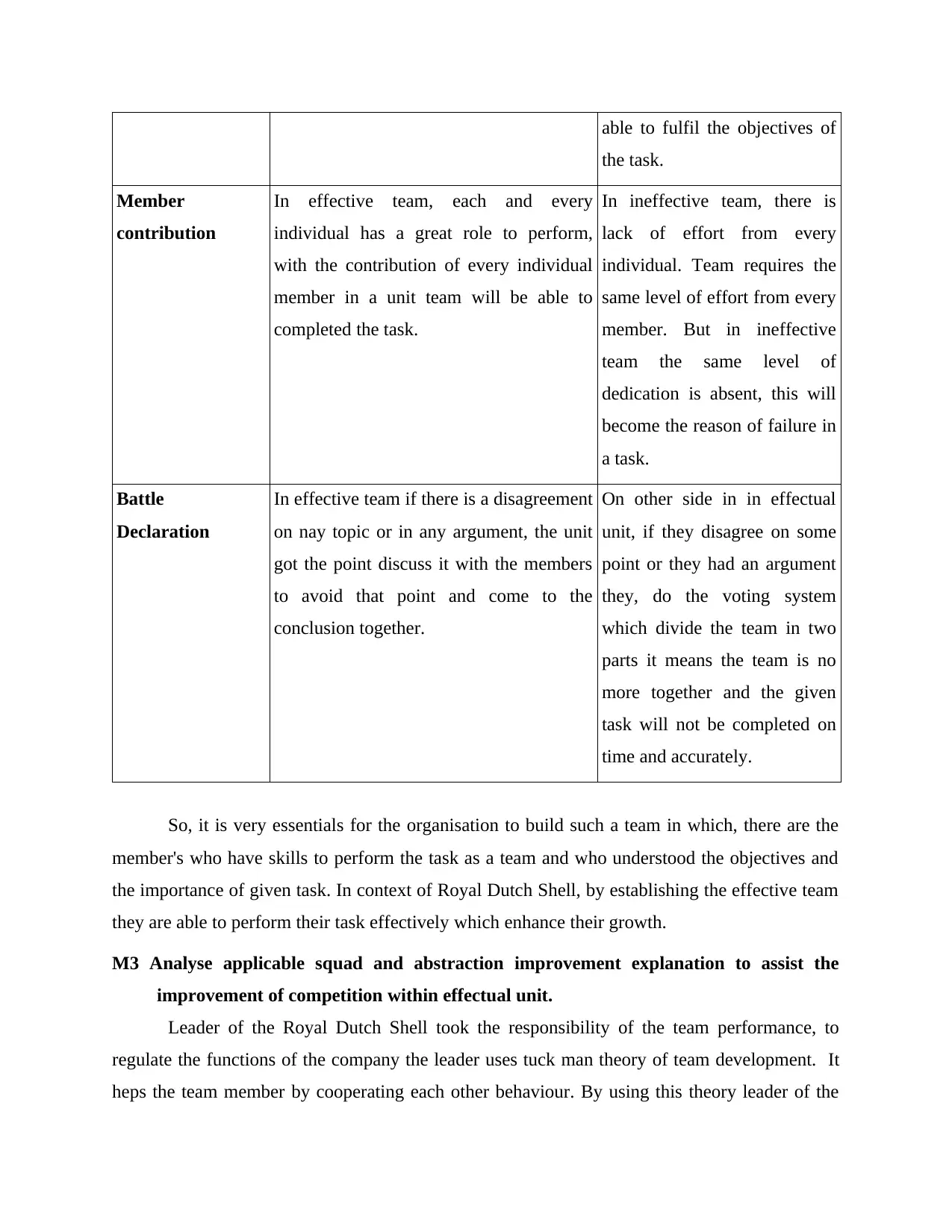
able to fulfil the objectives of
the task.
Member
contribution
In effective team, each and every
individual has a great role to perform,
with the contribution of every individual
member in a unit team will be able to
completed the task.
In ineffective team, there is
lack of effort from every
individual. Team requires the
same level of effort from every
member. But in ineffective
team the same level of
dedication is absent, this will
become the reason of failure in
a task.
Battle
Declaration
In effective team if there is a disagreement
on nay topic or in any argument, the unit
got the point discuss it with the members
to avoid that point and come to the
conclusion together.
On other side in in effectual
unit, if they disagree on some
point or they had an argument
they, do the voting system
which divide the team in two
parts it means the team is no
more together and the given
task will not be completed on
time and accurately.
So, it is very essentials for the organisation to build such a team in which, there are the
member's who have skills to perform the task as a team and who understood the objectives and
the importance of given task. In context of Royal Dutch Shell, by establishing the effective team
they are able to perform their task effectively which enhance their growth.
M3 Analyse applicable squad and abstraction improvement explanation to assist the
improvement of competition within effectual unit.
Leader of the Royal Dutch Shell took the responsibility of the team performance, to
regulate the functions of the company the leader uses tuck man theory of team development. It
heps the team member by cooperating each other behaviour. By using this theory leader of the
the task.
Member
contribution
In effective team, each and every
individual has a great role to perform,
with the contribution of every individual
member in a unit team will be able to
completed the task.
In ineffective team, there is
lack of effort from every
individual. Team requires the
same level of effort from every
member. But in ineffective
team the same level of
dedication is absent, this will
become the reason of failure in
a task.
Battle
Declaration
In effective team if there is a disagreement
on nay topic or in any argument, the unit
got the point discuss it with the members
to avoid that point and come to the
conclusion together.
On other side in in effectual
unit, if they disagree on some
point or they had an argument
they, do the voting system
which divide the team in two
parts it means the team is no
more together and the given
task will not be completed on
time and accurately.
So, it is very essentials for the organisation to build such a team in which, there are the
member's who have skills to perform the task as a team and who understood the objectives and
the importance of given task. In context of Royal Dutch Shell, by establishing the effective team
they are able to perform their task effectively which enhance their growth.
M3 Analyse applicable squad and abstraction improvement explanation to assist the
improvement of competition within effectual unit.
Leader of the Royal Dutch Shell took the responsibility of the team performance, to
regulate the functions of the company the leader uses tuck man theory of team development. It
heps the team member by cooperating each other behaviour. By using this theory leader of the
⊘ This is a preview!⊘
Do you want full access?
Subscribe today to unlock all pages.

Trusted by 1+ million students worldwide
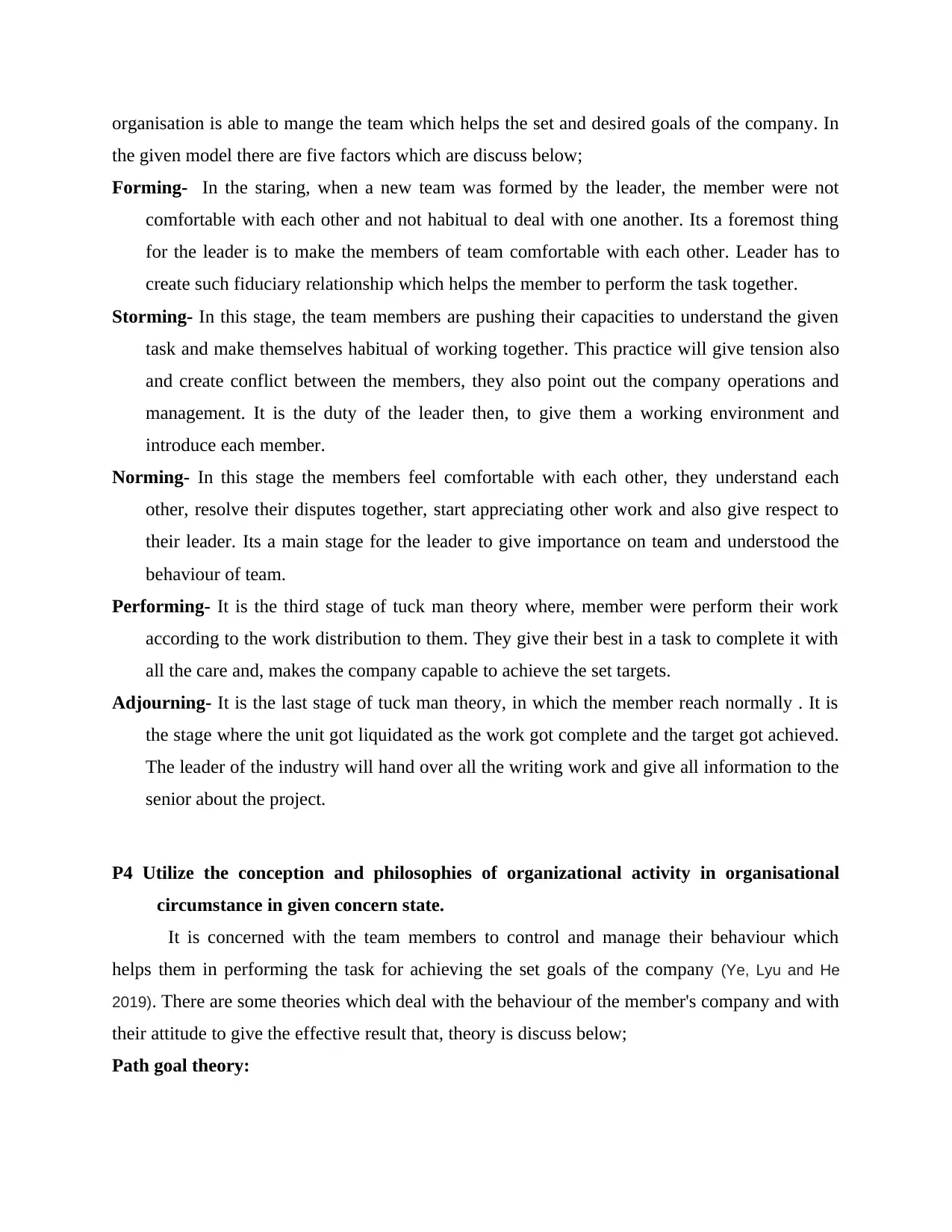
organisation is able to mange the team which helps the set and desired goals of the company. In
the given model there are five factors which are discuss below;
Forming- In the staring, when a new team was formed by the leader, the member were not
comfortable with each other and not habitual to deal with one another. Its a foremost thing
for the leader is to make the members of team comfortable with each other. Leader has to
create such fiduciary relationship which helps the member to perform the task together.
Storming- In this stage, the team members are pushing their capacities to understand the given
task and make themselves habitual of working together. This practice will give tension also
and create conflict between the members, they also point out the company operations and
management. It is the duty of the leader then, to give them a working environment and
introduce each member.
Norming- In this stage the members feel comfortable with each other, they understand each
other, resolve their disputes together, start appreciating other work and also give respect to
their leader. Its a main stage for the leader to give importance on team and understood the
behaviour of team.
Performing- It is the third stage of tuck man theory where, member were perform their work
according to the work distribution to them. They give their best in a task to complete it with
all the care and, makes the company capable to achieve the set targets.
Adjourning- It is the last stage of tuck man theory, in which the member reach normally . It is
the stage where the unit got liquidated as the work got complete and the target got achieved.
The leader of the industry will hand over all the writing work and give all information to the
senior about the project.
P4 Utilize the conception and philosophies of organizational activity in organisational
circumstance in given concern state.
It is concerned with the team members to control and manage their behaviour which
helps them in performing the task for achieving the set goals of the company (Ye, Lyu and He
2019). There are some theories which deal with the behaviour of the member's company and with
their attitude to give the effective result that, theory is discuss below;
Path goal theory:
the given model there are five factors which are discuss below;
Forming- In the staring, when a new team was formed by the leader, the member were not
comfortable with each other and not habitual to deal with one another. Its a foremost thing
for the leader is to make the members of team comfortable with each other. Leader has to
create such fiduciary relationship which helps the member to perform the task together.
Storming- In this stage, the team members are pushing their capacities to understand the given
task and make themselves habitual of working together. This practice will give tension also
and create conflict between the members, they also point out the company operations and
management. It is the duty of the leader then, to give them a working environment and
introduce each member.
Norming- In this stage the members feel comfortable with each other, they understand each
other, resolve their disputes together, start appreciating other work and also give respect to
their leader. Its a main stage for the leader to give importance on team and understood the
behaviour of team.
Performing- It is the third stage of tuck man theory where, member were perform their work
according to the work distribution to them. They give their best in a task to complete it with
all the care and, makes the company capable to achieve the set targets.
Adjourning- It is the last stage of tuck man theory, in which the member reach normally . It is
the stage where the unit got liquidated as the work got complete and the target got achieved.
The leader of the industry will hand over all the writing work and give all information to the
senior about the project.
P4 Utilize the conception and philosophies of organizational activity in organisational
circumstance in given concern state.
It is concerned with the team members to control and manage their behaviour which
helps them in performing the task for achieving the set goals of the company (Ye, Lyu and He
2019). There are some theories which deal with the behaviour of the member's company and with
their attitude to give the effective result that, theory is discuss below;
Path goal theory:
Paraphrase This Document
Need a fresh take? Get an instant paraphrase of this document with our AI Paraphraser
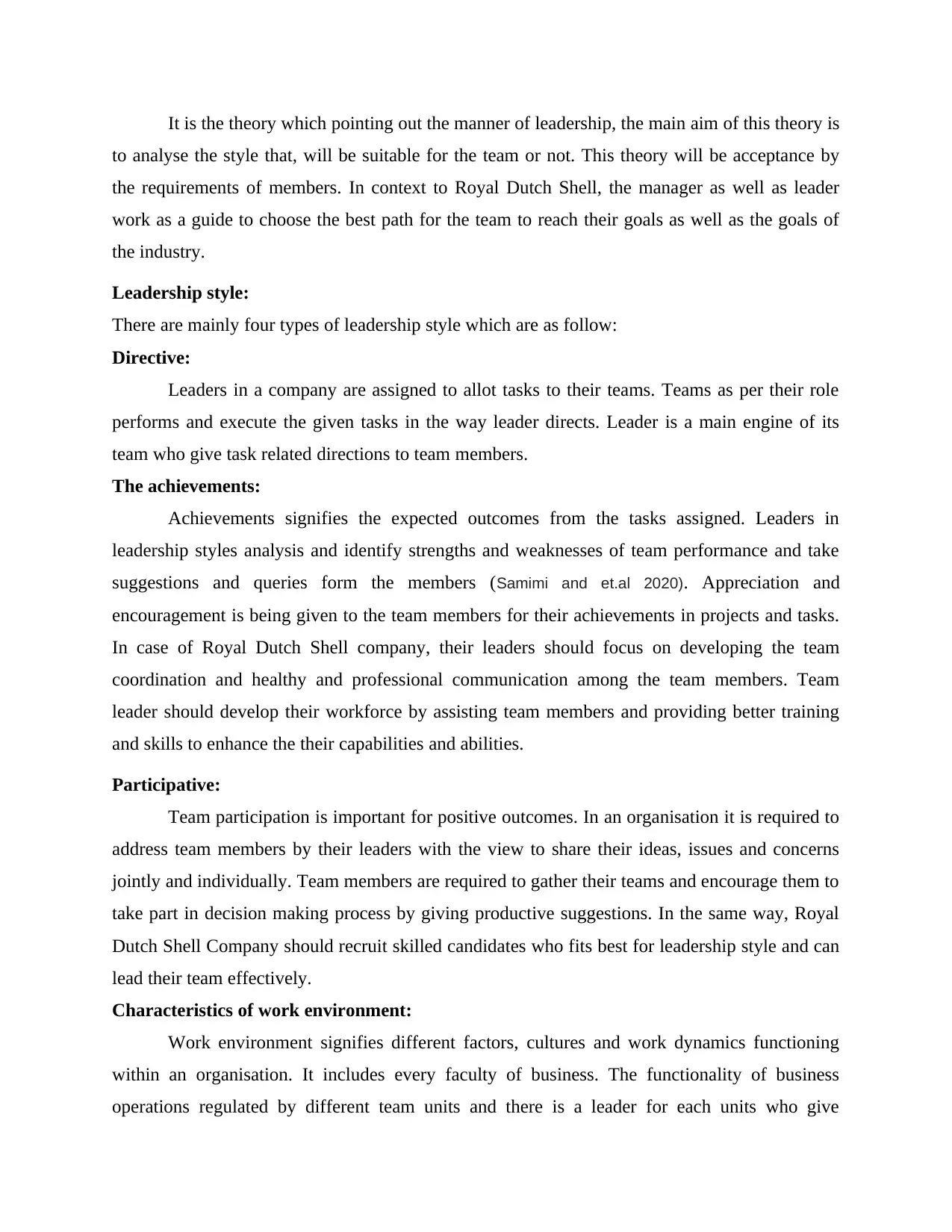
It is the theory which pointing out the manner of leadership, the main aim of this theory is
to analyse the style that, will be suitable for the team or not. This theory will be acceptance by
the requirements of members. In context to Royal Dutch Shell, the manager as well as leader
work as a guide to choose the best path for the team to reach their goals as well as the goals of
the industry.
Leadership style:
There are mainly four types of leadership style which are as follow:
Directive:
Leaders in a company are assigned to allot tasks to their teams. Teams as per their role
performs and execute the given tasks in the way leader directs. Leader is a main engine of its
team who give task related directions to team members.
The achievements:
Achievements signifies the expected outcomes from the tasks assigned. Leaders in
leadership styles analysis and identify strengths and weaknesses of team performance and take
suggestions and queries form the members (Samimi and et.al 2020). Appreciation and
encouragement is being given to the team members for their achievements in projects and tasks.
In case of Royal Dutch Shell company, their leaders should focus on developing the team
coordination and healthy and professional communication among the team members. Team
leader should develop their workforce by assisting team members and providing better training
and skills to enhance the their capabilities and abilities.
Participative:
Team participation is important for positive outcomes. In an organisation it is required to
address team members by their leaders with the view to share their ideas, issues and concerns
jointly and individually. Team members are required to gather their teams and encourage them to
take part in decision making process by giving productive suggestions. In the same way, Royal
Dutch Shell Company should recruit skilled candidates who fits best for leadership style and can
lead their team effectively.
Characteristics of work environment:
Work environment signifies different factors, cultures and work dynamics functioning
within an organisation. It includes every faculty of business. The functionality of business
operations regulated by different team units and there is a leader for each units who give
to analyse the style that, will be suitable for the team or not. This theory will be acceptance by
the requirements of members. In context to Royal Dutch Shell, the manager as well as leader
work as a guide to choose the best path for the team to reach their goals as well as the goals of
the industry.
Leadership style:
There are mainly four types of leadership style which are as follow:
Directive:
Leaders in a company are assigned to allot tasks to their teams. Teams as per their role
performs and execute the given tasks in the way leader directs. Leader is a main engine of its
team who give task related directions to team members.
The achievements:
Achievements signifies the expected outcomes from the tasks assigned. Leaders in
leadership styles analysis and identify strengths and weaknesses of team performance and take
suggestions and queries form the members (Samimi and et.al 2020). Appreciation and
encouragement is being given to the team members for their achievements in projects and tasks.
In case of Royal Dutch Shell company, their leaders should focus on developing the team
coordination and healthy and professional communication among the team members. Team
leader should develop their workforce by assisting team members and providing better training
and skills to enhance the their capabilities and abilities.
Participative:
Team participation is important for positive outcomes. In an organisation it is required to
address team members by their leaders with the view to share their ideas, issues and concerns
jointly and individually. Team members are required to gather their teams and encourage them to
take part in decision making process by giving productive suggestions. In the same way, Royal
Dutch Shell Company should recruit skilled candidates who fits best for leadership style and can
lead their team effectively.
Characteristics of work environment:
Work environment signifies different factors, cultures and work dynamics functioning
within an organisation. It includes every faculty of business. The functionality of business
operations regulated by different team units and there is a leader for each units who give
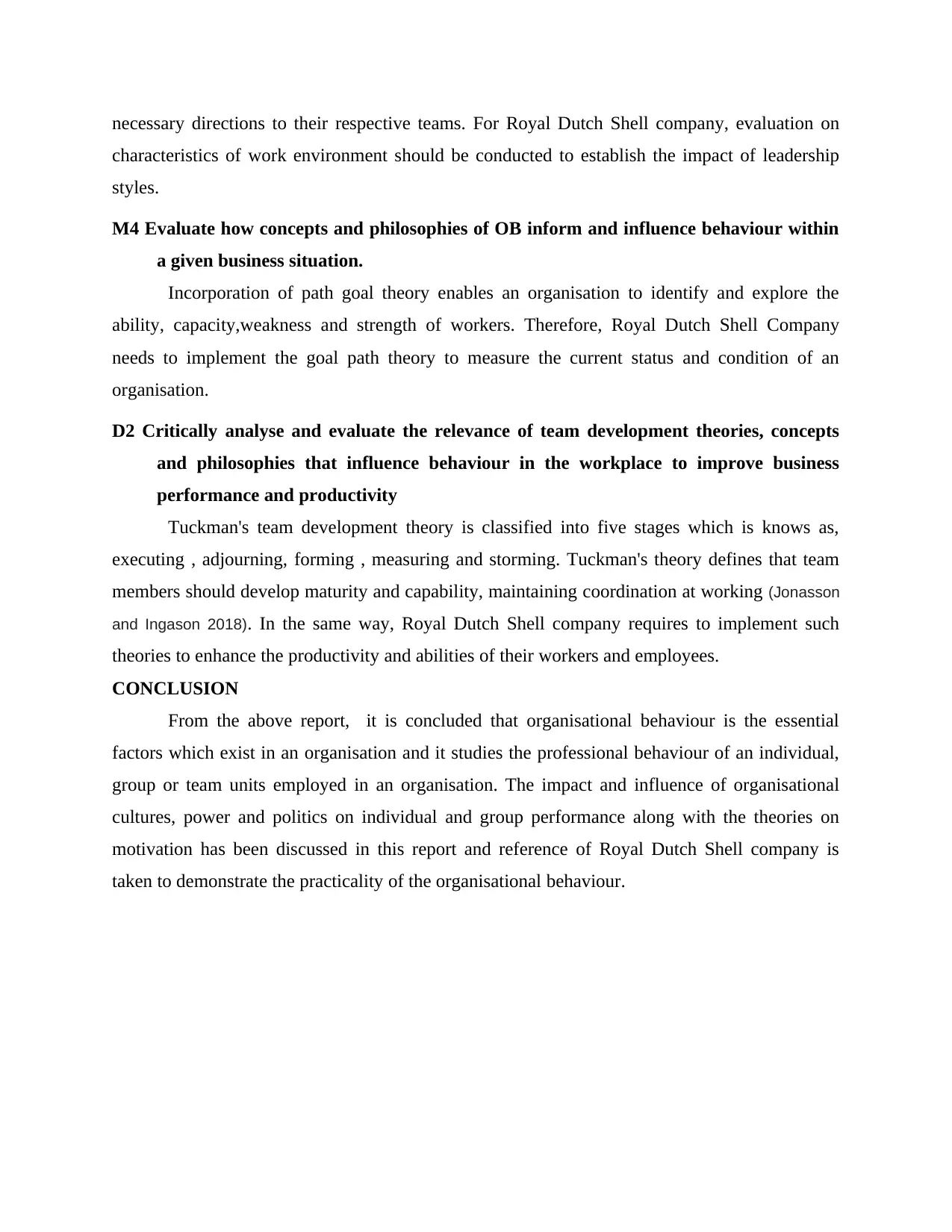
necessary directions to their respective teams. For Royal Dutch Shell company, evaluation on
characteristics of work environment should be conducted to establish the impact of leadership
styles.
M4 Evaluate how concepts and philosophies of OB inform and influence behaviour within
a given business situation.
Incorporation of path goal theory enables an organisation to identify and explore the
ability, capacity,weakness and strength of workers. Therefore, Royal Dutch Shell Company
needs to implement the goal path theory to measure the current status and condition of an
organisation.
D2 Critically analyse and evaluate the relevance of team development theories, concepts
and philosophies that influence behaviour in the workplace to improve business
performance and productivity
Tuckman's team development theory is classified into five stages which is knows as,
executing , adjourning, forming , measuring and storming. Tuckman's theory defines that team
members should develop maturity and capability, maintaining coordination at working (Jonasson
and Ingason 2018). In the same way, Royal Dutch Shell company requires to implement such
theories to enhance the productivity and abilities of their workers and employees.
CONCLUSION
From the above report, it is concluded that organisational behaviour is the essential
factors which exist in an organisation and it studies the professional behaviour of an individual,
group or team units employed in an organisation. The impact and influence of organisational
cultures, power and politics on individual and group performance along with the theories on
motivation has been discussed in this report and reference of Royal Dutch Shell company is
taken to demonstrate the practicality of the organisational behaviour.
characteristics of work environment should be conducted to establish the impact of leadership
styles.
M4 Evaluate how concepts and philosophies of OB inform and influence behaviour within
a given business situation.
Incorporation of path goal theory enables an organisation to identify and explore the
ability, capacity,weakness and strength of workers. Therefore, Royal Dutch Shell Company
needs to implement the goal path theory to measure the current status and condition of an
organisation.
D2 Critically analyse and evaluate the relevance of team development theories, concepts
and philosophies that influence behaviour in the workplace to improve business
performance and productivity
Tuckman's team development theory is classified into five stages which is knows as,
executing , adjourning, forming , measuring and storming. Tuckman's theory defines that team
members should develop maturity and capability, maintaining coordination at working (Jonasson
and Ingason 2018). In the same way, Royal Dutch Shell company requires to implement such
theories to enhance the productivity and abilities of their workers and employees.
CONCLUSION
From the above report, it is concluded that organisational behaviour is the essential
factors which exist in an organisation and it studies the professional behaviour of an individual,
group or team units employed in an organisation. The impact and influence of organisational
cultures, power and politics on individual and group performance along with the theories on
motivation has been discussed in this report and reference of Royal Dutch Shell company is
taken to demonstrate the practicality of the organisational behaviour.
⊘ This is a preview!⊘
Do you want full access?
Subscribe today to unlock all pages.

Trusted by 1+ million students worldwide
1 out of 13
Related Documents
Your All-in-One AI-Powered Toolkit for Academic Success.
+13062052269
info@desklib.com
Available 24*7 on WhatsApp / Email
![[object Object]](/_next/static/media/star-bottom.7253800d.svg)
Unlock your academic potential
Copyright © 2020–2026 A2Z Services. All Rights Reserved. Developed and managed by ZUCOL.


